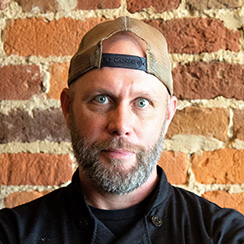Listen to This Article:
Have you ever wondered what it really takes to rise to the rank of chef or executive chef?
You might wonder if it requires lots of training, or will a few years of experience as a professional cook suffice. Certainly, there are those who have attained the role of chef by working their way up through the kitchen ranks, from dishwasher to executive chef. But while this route is possible, it may not be the best option if you long to call yourself “chef.”
It’s true that some successful chefs are high school graduates with no formal training. You could look at that fact and assume your level of education is irrelevant to becoming a chef, but you would be mistaken. Plenty of the food world’s most successful chefs got their education in culinary school.
Let’s discuss the level of education a chef may need to be successful, the value of different study paths, and how they may be able to fast-track their learning and career.
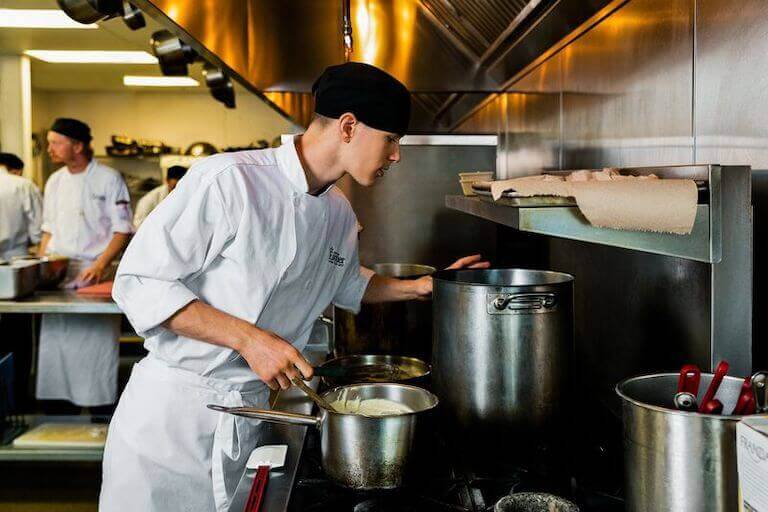
Chefs manage many aspects of a restaurant kitchen, from finances and budgeting to recipe standardization.
What Does an Executive Chef Actually Do?
Most people think of a chef as a high-level cook. However, this is only partly true.
An executive chef is a high-level restaurant manager. An executive chef is responsible for everything that happens in the kitchen.
The chef may design aspects of the menu and create the recipes. They can even supervise hiring, training, and firing of staff and ensure that every member of the kitchen staff is meeting their culinary standards daily. They have to manage food and labor costs to ensure that the restaurant is profitable. They oversee inventory and scheduling, and may even have to make public appearances to promote the restaurant.
While some of these tasks may be delegated to the sous chef, the buck stops with the executive chef.
*Information may not reflect every student’s experience. Results and outcomes may be based on several factors, such as geographical region or previous experience.
The chef also creates the culture and sets the tone for the kitchen. A great executive chef will support their team, make sure they’re well-trained, and help them to work through setbacks with a positive attitude.
To do all of this, a chef needs to have comprehensive knowledge of more than just how to cook. From business to management, from procurement to human resources, chefs are the CEOs of restaurant kitchens.
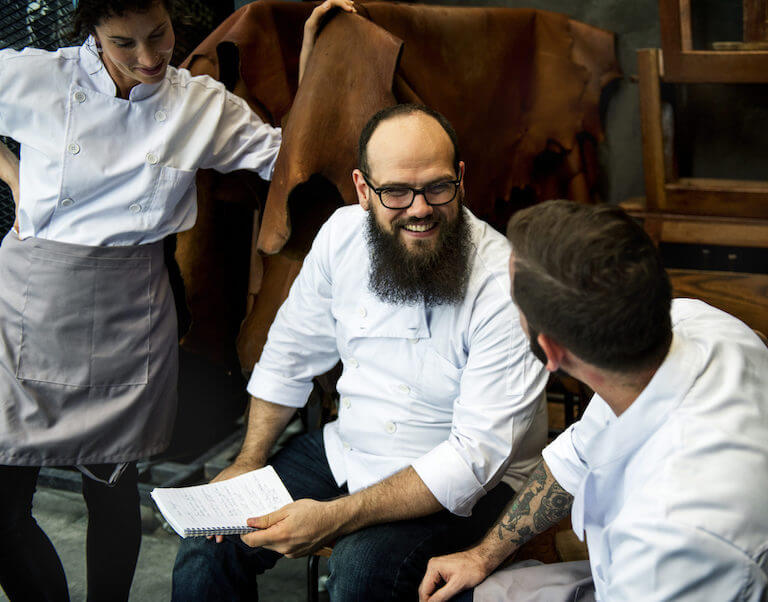
Executive chefs work to keep the kitchen community working like a well-oiled machine.
What Might a Chef Need to Know?
So, what kinds of specific knowledge and skills might an aspiring chef need to succeed as a chef? Let’s take a look at what kind of role a chef plays in the kitchen.
Menu Planning and Recipe Development
The chef must be skilled in flavor profiles, food pairings, and food science, so they can create delicious recipes.
Not only does the chef have to invent these dishes, but they have to clearly document them. The rest of the kitchen can then recreate them over and over again, the same way each time, to keep the restaurant budget in check. This means the chef needs a unique combination of culinary, recipe-writing, and food math skills. Many of these skills can be difficult to learn without formalized training.
Communication and Leadership
Chefs are managers, and they have to effectively communicate with their staff. This skill set has received more attention in recent years, as the entire industry makes strides to become a warmer, more welcoming work environment.
Kitchens are unique work environments similar to a factory assembly line. Each part of the kitchen staff helps keep the restaurant efficient, but this doesn’t happen automatically. A skilled executive chef knows how to keep their line staff happy and busy in a high-pressure, stressful environment. A chef who succeeds with this task can reduce staff turnover, and produce better food quality.
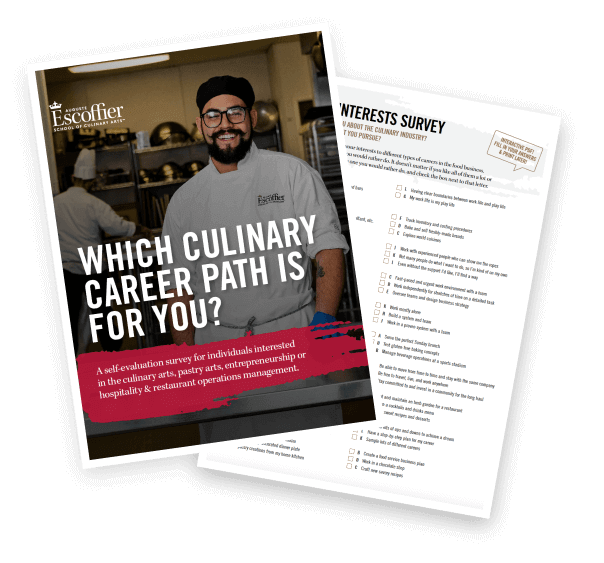
Take the Culinary Career Survey
We’ve compiled a checklist of all of the essential questions into one handy tool: career options, culinary interest surveys, educational opportunities, and more.
Cost Control and Basic Foodservice Accounting
Chefs are not accountants, but carefully managing labor and food costs is necessary to ensure restaurant profitability. Profit margins are often tight in restaurants, and something as simple as serving five ounces of steak instead of four can throw those margins off.
The same applies to labor. The executive chef and team must carefully watch labor costs to prevent expensive overtime and avoid overstaffing on slow shifts.
Extensive Knowledge of Ingredients and Seasonality
To support both cost control and recipe development, chefs should know a great deal about seasonality and ingredient sourcing. Out-of-season ingredients may come at a higher cost when they’re imported from far away, rather than in-season produce from the farm down the road. And they may not taste as good.
Chefs must know when they can serve a seasonal dish from both a cost and quality standpoint.
They should also be familiar with ingredients from other culinary cultures. By adding unexpected flavors to their dishes, chefs keep their recipes exciting and creative.
Chef Specialties
In addition to these general chef requirements, depending on your preferred area of focus, you may need advanced training in certain chef specialties. If desserts are your jam, you may need training as a pastry chef. If you prefer savory grilling you may need training as a pit master or grill chef. Other types of chef specialties include saucier (sauce chef), garde manger (cold food and deli chef), research and development chef, or ethnic cuisine chef.
There are typically two ways to earn all of this knowledge—in a culinary program or on the job. Though there are advantages to each, let’s take a look at how these two methods of learning the ropes are different.
Getting Your Chef Education in Culinary School
While there are several ways to acquire the skills you need to become a professional chef, culinary school can provide you with them. Even though students don’t graduate as chefs, they can enter the restaurant workforce miles ahead of a culinarian who has simply spent the same amount of time working as a line cook in a kitchen.
For example, Culinary Arts programs at Auguste Escoffier School of Culinary Arts are available as in person or online experiences, and range from 30 to 84 weeks long. These programs are carefully planned so that by the end, students are armed with the comprehensive skills they may need to be ready to advance in professional kitchens.
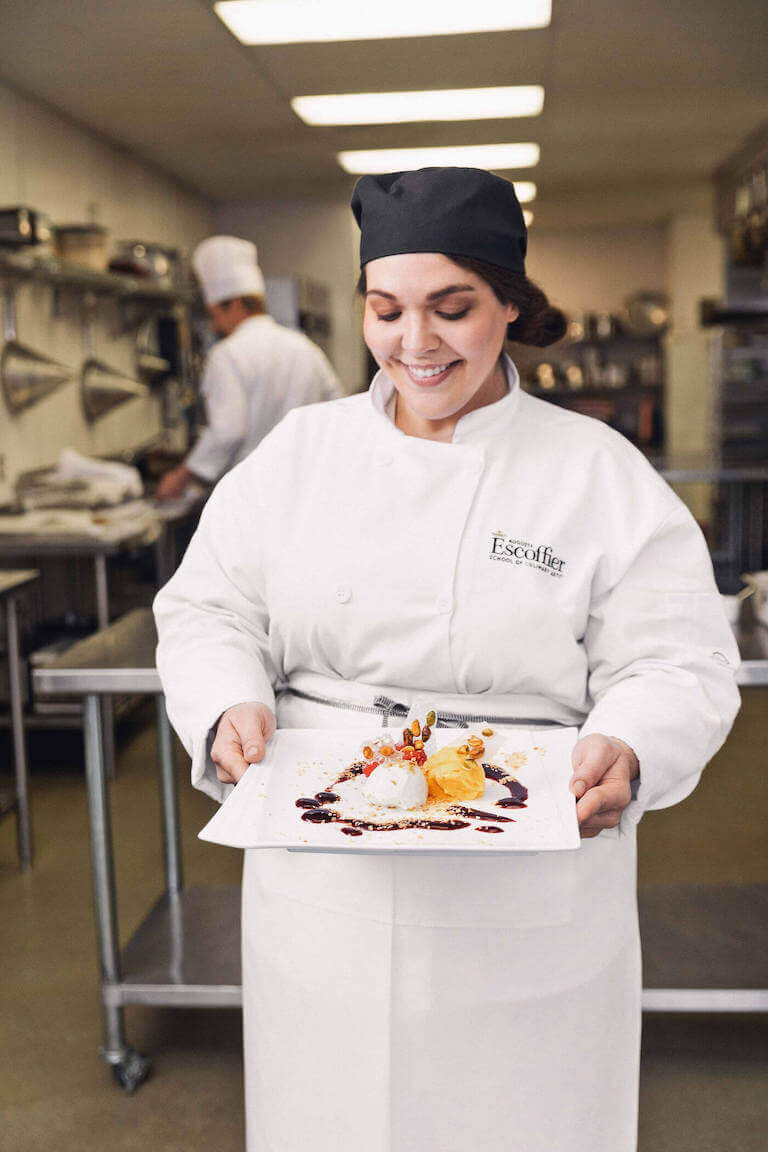
Escoffier students can learn the essential skills executive chefs may need to be successful.
Culinary school doesn’t only include extensive training and study in the art and science of cooking. Students may also study menu planning in the Restaurant Operations course, and how to communicate with employees and vendors in the Business and Professional Communications course. Coursework in cost control, food service math and accounting helps aspiring chefs develop knowledge of how to effectively manage a restaurant for profitability.
Escoffier also provides training in understanding seasonality and sustainability in their signature Farm to Table® Experience. This topic helps new chefs explore where our food comes from and how to incorporate sustainability principles into their kitchens and menus.
Additional training in pastry arts, world cuisine, kitchen foundations, nutrition, and more are all part of various programs’ curricula.
At the end of this training, culinary school students usually complete one or two hands-on industry externships (depending on the program), where they can get hands-on experience and see how what they learned applies to a working kitchen environment.
*Information may not reflect every student’s experience. Results and outcomes may be based on several factors, such as geographical region or previous experience.
These programs are designed to give culinary students the skills they may need to compete in the food service industry. Students who have this training can be more likely to receive job offers because restaurant owners and managers know that an incoming employee with a culinary degree may have a more complex skill set and require less training. But what if you prefer to get your chef education by gaining experience while working in a kitchen instead of in culinary school?
Getting Your Chef Education On the Job
Not everyone thinks they have the time or money to attend culinary school, so some cooks hope to move into a chef position by being mentored on the job.
Chefs who take this path have varying levels of success. On the one hand, you will receive the exact training you need to succeed in that specific restaurant, and many of those skills likely apply in any restaurant kitchen.
However, the restaurant environment is fast-paced and restaurant owners and managers are (rightfully) more interested in providing a good experience to the guests than in educating their staff. Though it is certainly possible to attain the position of chef by getting training in the kitchen, here’s why trying to gain a chef education “on the job” can be slower than getting educated in culinary school.
Discover Fewer Techniques
In a restaurant, you may only learn the techniques you need to execute that restaurant’s menu. You may have to spend years at a variety of restaurants to learn the same number of skills you could learn in a much shorter time in a culinary arts program.
Access to Narrower Range of Mentors
Many nuances of cooking can be learned from mentors that have direct experience. In school, you can learn from a number of Chef Instructors who can help answer questions and provide advice. Escoffier Chef Instructors have various industry experiences and knowledge to share with students.
Not All Restaurants Maintain the Same Standards
While many restaurants do focus on a high level of sanitation, food quality, and good kitchen habits, not all are as diligent. If you find yourself in a lax kitchen, you may not even realize you’re picking up bad habits until you move on to your next position.
Regardless of how you start, you will continue to learn as you work your way through the kitchen ranks. That doesn’t stop when you graduate. But you may be able to reach the goal of chef more quickly if you have a culinary arts education.
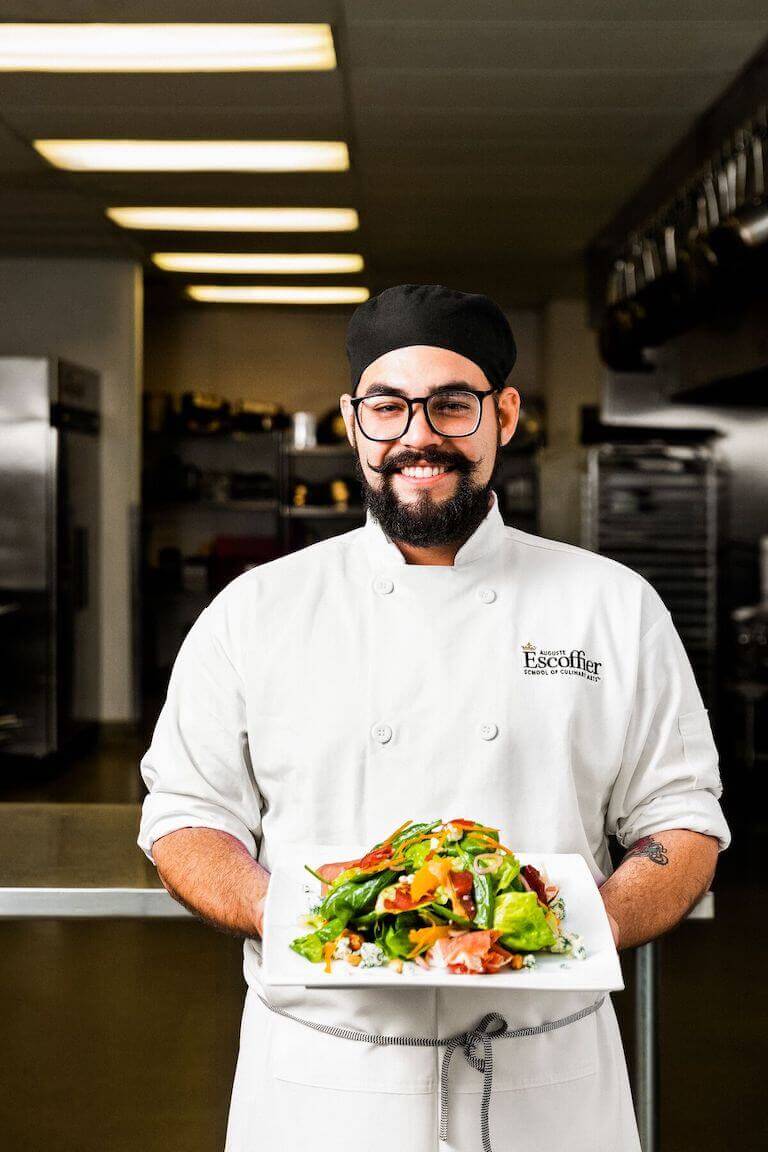
Getting an education in culinary arts can help you gain the skills needed to be an executive chef faster than learning on the job.
Do You Need a Degree to Be a Chef?
Ultimately, the requirements to succeed as a chef vary, but this much is clear: you may need enough education to be able to
- Create inventive new dishes
- Document them
- Manage the kitchen’s staff, inventory, costs, and labor
- Provide training
- Maintain high sanitation and quality standards, and
- Be a mentor while you’re at it.
While a formal chef’s education in culinary school is not a requirement to become a chef, the knowledge is. Inexperienced cooks who find themselves donning the chef’s hat can quickly get overwhelmed, and the whole restaurant can suffer.
A more likely path to success can start with a high-quality culinary school education. Then you can work on honing your skills and building your knowledge over several years in professional kitchens building on what you learned in school. This combination of formal education and practical experience is what can make a great chef.
Ready to begin? Contact us today for more information about online and on-campus culinary degrees and diplomas.
LEARN MORE ABOUT THE BENEFITS OF A CHEF’S EDUCATION WITH THESE RESOURCES:
- Do You Need to Know How to Cook to Go to Culinary School?
- What You Can Learn from a Culinary School Externship
- What to Look For in a Good Culinary Arts Curriculum
This article was originally published on July 30, 2021 and has been updated.
*Information may not reflect every student’s experience. Results and outcomes may be based on several factors, such as geographical region or previous experience.

